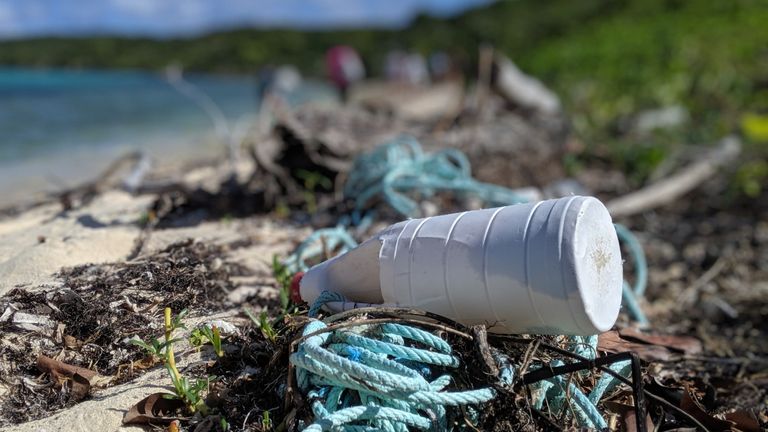Amazon’s plastic waste soared by 29% during the pandemic, according to analysis by conservation group Oceana.
It estimates that in 2020 the online retail giant generated an additional 272 million kg of plastic packaging, including air pillows, bubble wrap and plastic lined envelopes, compared with 211 million kg in 2019.
The advocacy group says the total would be enough to circle the world 600 times in the form of Amazon’s air pillows.
Plastic too often ends up clogging up waterways and polluting oceans, it warned.
Oceana’s Matt Littlejohn told Sky News that Amazon was “now the world’s largest retailer outside of China and increasingly defining how we get our packages”.
Oceana also said that Amazon’s recycling promises did not end up reducing its “very large plastic packaging waste footprint”.
Much of the packaging film marked as recyclable is “rarely accepted by municipal recycling programmes”, its report said.
However the group commended Amazon’s action to eliminate single waste plastic in India, and its reported plans to do the same in Germany, one of its largest markets.
Mr Littlejohn urged Amazon to extend these efforts worldwide.
Subscribe to ClimateCast on Spotify, Apple Podcasts, or Spreaker.
Amazon said Oceana’s calculations were “seriously flawed” for a second year in row.
“They have overestimated our plastics usage by more than 300 per cent, and use outdated assumptions about the sources of plastic waste entering our oceans,” a spokesperson said.
However, it refused to confirm how much plastic it had used when Sky News asked.
Oceana said that after Amazon disputed its last assessment, it asked the retailer to disclose data on its plastic footprint.
As Amazon declined, Oceana continued to estimate the plastic totals based on publicly available data, the report said.
Plastics are made from fossil fuels in a process that generates significant greenhouse gas emissions. Much of it is used just once, and it takes years to break down.
Meanwhile new polling has found that almost two thirds (64%) of adults were aiming to make their Christmas more eco-friendly this year, with 35% inspired to act by recent news about the climate and nature crisis.
Conservation charity WWF, which commissioned the survey by Opinium Research, has labelled it the “COP26 effect”.
Watch the Daily Climate Show at 6.30pm Monday to Friday on Sky News, the Sky News website and app, on YouTube and Twitter.
The show investigates how global warming is changing our landscape and highlights solutions to the crisis.

